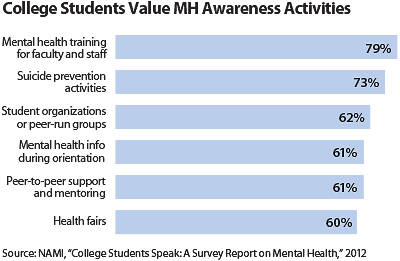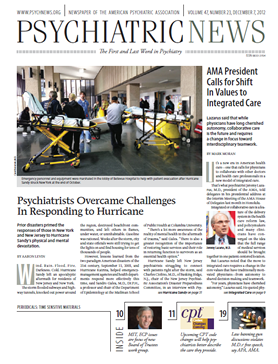Each year millions of students enter college, and for many this will be the first time they will be living on their own. For some students, the dual pressures of independent living and demanding school work can lead to mental health problems. Other students come to college with mental health problems.
The National Alliance on Mental Illness (NAMI) conducted a nationwide online survey asking college students with mental health conditions about their experiences in college. NAMI sought opinions on ease of access to mental health services and resources and on factors that would keep students from dropping out due to mental health issues. NAMI released the report last month.
Responses were collected from August 2011 to November 2011. NAMI received 765 responses from students who were currently enrolled in college or had been within the previous five years. Each section of the report included response breakdowns with corresponding tips on how to increase awareness of mental health services and reduce the number of dropouts. The authors of the report added that while some colleges will see these tips as confirmation of their efforts, others can use the tips as guidelines for improving their services and outreach to students with mental health problems.
The survey showed that 64 percent of the respondents who experienced a mental health problem during college ended up dropping out. Of that group, 50 percent did not seek any mental health services or support. Students cited not knowing whether they were qualified to receive accommodations, their lack of knowledge about campus mental health resources, fear of stigma, and burdensome applications for accommodations as reasons why they did not pursue mental health services.
However, the students did indicate that receiving accommodations (such as tutoring, lighter course loads, or communication with professors) or accessing the mental health services and support on campus would have helped them to stay in school.
“The numbers are dramatic. They point to a ’shadow’ mental health crisis that colleges and universities need to address,” said NAMI Executive Director Michael Fitzpatrick.
There was a wide range of ratings by the students of their schools’ mental health services and resources, with some schools rated as excellent while others were lacking in key areas that would benefit students with mental health problems.
In the report, NAMI leaders suggested promoting and publicizing mental health services and accommodations to all students, reducing paperwork needed to receive help, and encouraging peer-support groups and clubs as ways to reduce the number of dropouts. In another section of the report, the authors also underscored the importance of educating students and faculty about mental health and creating support programs to eradicate the stigma that so often attaches to mental illness.
“Mental illness can be treated and successfully managed, but too many students are forced to abandon their promise and talent when they confront mental health issues in their college careers,” said Fitzpatrick.
Disclosure was found to be a significant factor among those students who chose not to access mental health resources. To obtain accommodations from their college, the law requires students to disclose their diagnosis. The researchers found that half of the students disclosed their mental health issue to receive accommodations and support. The other half reported being fearful of disclosure due to stigma or not disclosing because their problem did not have an impact on academic performance.
“I was concerned that the information would become part of a permanent record that could be viewed negatively. I still feel that there is a lot of stigma, and the benefits of disclosing do not outweigh the risks,” wrote one survey respondent.
Eighty-two percent of the survey respondents were women; depression and bipolar illness were the most common diagnoses, accounting for 51 percent of the reported disorders.
“Women are two times more likely than men to experience depression during their lifetime. Depression is the highest represented mental health condition among survey respondents, which might help to explain the high percent age of women who responded to the survey,” said the report’s authors. “It is also likely that women are more comfortable sharing information about their mental health needs.”
“It is extremely difficult for students to come out and talk about mental health problems, and they may not want to tell you that this is why they are falling behind, missing class, seeming disengaged, etc.,” wrote another respondent. “Please be sensitive and understand mental health problems are ’real’ problems. Encourage [students] to find help through the health center and academic advising.”


